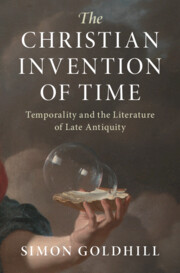Book contents
- The Christian Invention of Time
- Greek Culture in the Roman World
- The Christian Invention of Time
- Copyright page
- Contents
- Acknowledgements
- Abbreviations of Ancient Sources
- Introduction
- Part I
- Part II
- Chapter 11 Beginning, Again
- Chapter 12 The Eternal Return
- Chapter 13 Regulation Time
- Chapter 14 Day to Day
- Chapter 15 ‘We Are the Times’
- Coda
- Bibliography
- Index Locorum
- Subject Index
Chapter 13 - Regulation Time
Gregory’s Christmas Day
from Part II
Published online by Cambridge University Press: 13 January 2022
- The Christian Invention of Time
- Greek Culture in the Roman World
- The Christian Invention of Time
- Copyright page
- Contents
- Acknowledgements
- Abbreviations of Ancient Sources
- Introduction
- Part I
- Part II
- Chapter 11 Beginning, Again
- Chapter 12 The Eternal Return
- Chapter 13 Regulation Time
- Chapter 14 Day to Day
- Chapter 15 ‘We Are the Times’
- Coda
- Bibliography
- Index Locorum
- Subject Index
Summary
Gregory of Nazianzus also had stars in his eyes. Some seventy years before Nonnus depicted Demeter having a horoscope cast for Persephone, in both sermons and theological poetry Gregory was setting the agenda for a Christian understanding of astrology. It was a project that deeply influenced the discourse of Nonnus’ epics, not just on the stars but also on temporality. For, in Gregory’s hands, astrology opened a broad vista onto the theological conflicts of the post-Nicaean era, and the active heritage of Greek learning in Christian culture. The collection of hexameter poems known as the Aporrhēta in Greek (and Poemeta Arcana in Latin) – the ‘ineffable’, or ‘secret’ matters – takes on astrology as a subject for debate along with such weighty topics as the Cosmos or the Soul, which gives an immediate indication of astrology’s importance in Gregory’s thinking; but it is first in one of his Theological Orations, the sermons which were one primary cause of Gregory being known in Byzantium simply as ‘The Theologian’, that we will trace the significance of looking at the heavens for Gregory’s understanding of how a Christian inhabits time.
- Type
- Chapter
- Information
- The Christian Invention of TimeTemporality and the Literature of Late Antiquity, pp. 314 - 336Publisher: Cambridge University PressPrint publication year: 2022

